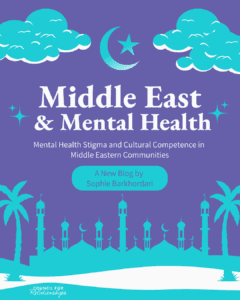Mental Health Stigma & Cultural Competence in the Middle East
Mental health remains a difficult topic in many Middle Eastern communities, where values such as strength, privacy, and honor often discourage open emotional expression. As a result, mental health stigma is widespread, making it harder for individuals to seek help without shame or fear of judgment. Healing begins when clients find therapy that reflects cultural competence—an approach in which therapists respect and understand the client’s cultural background.
This blog explores the roots of stigma in Middle Eastern families and how culturally aware health care, including therapy, can help break cycles of silence and promote emotional well-being.

Get matched with a CFR Therapist today.
Understanding Middle Eastern Culture and Mental Health Stigma
The Middle East is a diverse region that includes countries like Iran, Syria, Lebanon, and Iraq, each with its own history, culture, and languages. This society deeply integrates Islam, a major religion that teaches belief in one God.
Although customs vary across countries, common values include national pride, respect for elders, honoring family, and maintaining a patriarchal family structure. Historically, a Middle Eastern family’s social standing depended on maintaining a strong reputation. These outdated norms continue to silence Middle Eastern individuals from seeking emotional support and perpetuate mental health stigma.
Cultural Expectations Reinforcing Mental Health Stigma
Certain Middle Eastern principles—such as concealing emotions, family honor, and patriarchal norms—clash with the open discussion encouraged in mental health therapy, increasing mental health stigma. Emotional expression often receives negative social responses, reinforcing stigma. Many people see seeking therapy as shameful, which makes the stigma worse. Misconceptions of mental illness as dangerous or weak amplify this stigma further.
Islamic beliefs sometimes frame mental illness as a weakness of faith or punishment from God, complicating counseling and reinforcing existing stigma.
Consequences of Silence and Suppression
Avoiding emotional expression leads to severe long-term effects, including bottled-up feelings, strained relationships, delayed help-seeking, and unresolved trauma. Emotional suppression negatively impacts cognitive functioning and social satisfaction.
These consequences illustrate the critical need for therapy grounded in cultural competence, enabling therapists to help clients overcome barriers created by mental health stigma.
Addressing Common Challenges with Cultural Competence
Middle Eastern individuals navigate complex family dynamics, systemic stressors, and unique psychological challenges. Traditional family values focused on being perfect and following strict gender roles make it harder to build good mental health, leading to self-criticism, shame, and stigma.
Recognizing historical and generational trauma, such as war, displacement, immigration, sexism, and racism, is vital. Effective therapy incorporates cultural competence, acknowledging these stressors and their impacts.
Cultural competence means a therapist is attuned to a client’s background, including their cultural values, language, religion, and family norms. For example, a culturally competent therapist working with a Middle Eastern client may understand how family reputation impacts decision-making or how gender roles shape emotional expression. Instead of treating these patterns as problems, they explore them with curiosity and respect. This creates a space where clients do not feel the need to explain or defend their experiences—they can just be.
Cultural competence also means understanding how mental health challenges play out across different cultural contexts, including the family, religion, and gender roles within Middle Eastern communities.
Therapists create a powerful space for healing and growth when they see clients through the lens of their culture.
Breaking the Cycle of Mental Health Stigma with Cultural Competence
Raising mental health awareness is crucial. When trusted community leaders normalize mental health conversations, they significantly reduce mental health stigma. Younger generations openly discussing mental health can shift cultural perceptions, encouraging others to seek support.
Increasing access to therapists who practice cultural competence plays a pivotal role. Representation matters; seeing therapists who are familiar with their experiences reassures clients. Therapists offering safe spaces and acknowledging cultural values and spiritual beliefs make therapy meaningful and authentic. Empathy and understanding grounded in cultural competence are fundamental to breaking stigma and promoting healing.
Therapists who understand how mental health stigma shows up in diverse populations can better support clients from communities like the Middle East. By embracing cultural humility and compassion, we invite more people into therapeutic spaces and begin meaningful journeys toward emotional well-being.
Editor’s Note: The views expressed in this blog are those of the author and do not necessarily reflect the official policy or position of Council for Relationships.
More from CFR
Council for Relationships (CFR) is committed to providing accessible, specialized, and expert therapy, clinical training, and research to strengthen interpersonal connections.

CFR Clinical Interns like Sophie Barkhordari offer low-fee therapy services. Learn more.
About the Author: Sophie Barkhordari
Sophie Barkhordari is a Clinical Intern at Council for Relationships and a graduate student at Thomas Jefferson University. As a Persian-American woman, Sophie passionately explores intersections between mental health, cultural competence, and Middle Eastern identities. Sophie’s clinical practice focuses on strengthening emotional awareness and connection within individuals and couples. As a culturally competent therapist, Sophie emphasizes creating safe, non-judgmental therapeutic spaces.
About CFR’s Clinical Internship Program
Council for Relationships’ Clinical Internship Program provides extensive training, mentorship, and practical experience for graduate students and emerging therapists. Interns like Sophie engage deeply in culturally competent practice, fostering expertise in therapeutic approaches and client care across diverse communities.
Get Matched with a Therapist Who Centers Cultural Competence
If you’re looking for personalized mental health support, get matched with one of CFR’s 80+ expert therapists and psychiatrists today. We’re ready to help you find the care you deserve.
Continuing to Learn with CFR
Council for Relationships regularly shares resources to help deepen your understanding of mental health topics, including cultural competence and overcoming stigma. For example, our blogs “Exploring Men’s Mental Health Through IFS Therapy” and “Minority Stress & LGBTQ+ Mental Health: What to Know” offer insights into culturally sensitive therapy practices. Additionally, by signing up for our newsletter, you can receive valuable mental health advice and updates directly in your inbox.
Coping with Bipolar Disorder: Breaking Stigma & Empowering Recovery
CFR Named “Best for Culturally Inclusive Sex Therapy” by Verywell Mind
